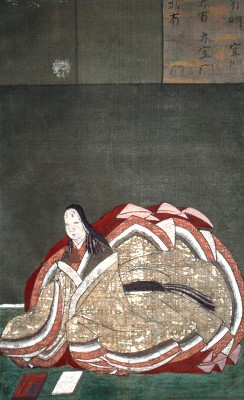“Real things in the darkness seem no realer than dreams.”
Zdroj: Tale of Genji, The Tale of Genji, trans. Arthur Waley, Ch. 1: Kiritsubo
Murasaki Šikibu byla japonská spisovatelka, básnířka a dvorní dáma na císařském dvoře během období Heian. „Murasaki Šikibu“ nebylo její pravé jméno. Její skutečné jméno zůstává neznámé, i když někteří odborníci se domnívají, že její jméno mohlo být Takako. Ve svém deníku se zmiňuje, že u dvora byla přezdívána „Murasaki“ podle postavy z Příběhu prince Gendžiho. „Šikibu“ se vztahuje k pozici jejího otce v Úřadu pro dvorní etiketu .
Murasaki je známá díky svému románu Příběh prince Gendžiho napsaným japonsky mezi lety 1000 až 1014 nebo 1020, který je jedním z nejranějších a nejslavnějších románů v dějinách.
Wikipedia

“Real things in the darkness seem no realer than dreams.”
Zdroj: Tale of Genji, The Tale of Genji, trans. Arthur Waley, Ch. 1: Kiritsubo
Passim. Cf. Lacrimae rerum.
Variant translations:
The pathos of things.
A sensitivity to things.
The sorrow of human existence.
Tale of Genji
Zdroj: Tale of Genji, Ch. 17: Eawase (trans. Royall Tyler)
Zdroj: The Tale of Genji
“Ceaseless as the interminable voices of the bell-cricket, all night till dawn my tears flow.”
Zdroj: Tale of Genji, The Tale of Genji, trans. Arthur Waley, Ch. 1
source http://no-sword.jp/blog/2010/03/iced_cream.html
The Diary of Lady Murasaki
Zdroj: Tale of Genji, The Tale of Genji, trans. Arthur Waley, Ch. 29: The Royal Visit
“It is in general the unexplored that attracts us.”
Zdroj: Tale of Genji, The Tale of Genji, trans. Arthur Waley, Ch. 9: Aoi
“There are as many sorts of women as there are women.”
Zdroj: The Tale of Genji
trans. Richard Bowring (Penguin Books, 1996)
The Diary of Lady Murasaki
“Unforgettably horrible is the naked body. It really does not have the slightest charm.”
The Diary of Lady Murasaki
Spoken by Tō no Chūjō in Ch. 2: The Broom Tree (trans. Royall Tyler)
Tale of Genji
Zdroj: Tale of Genji, The Tale of Genji, trans. Arthur Waley, Ch. 25: The Glow-Worm
Zdroj: Tale of Genji, The Tale of Genji, trans. Arthur Waley, Ch. 19: A Wreath of Cloud
Zdroj: Tale of Genji, The Tale of Genji, trans. Arthur Waley, Ch. 25
Zdroj: Tale of Genji, The Tale of Genji, trans. Arthur Waley, Ch. 20: Asagao
Zdroj: Tale of Genji, The Tale of Genji, trans. Arthur Waley, Ch. 36: Kashiwagi
Zdroj: Tale of Genji, The Tale of Genji, trans. Arthur Waley, Ch. 41: Mirage
Zdroj: Tale of Genji, The Tale of Genji, trans. Arthur Waley, Ch. 40: The Law
In Diaries of Court Ladies of Old Japan
The Diary of Lady Murasaki